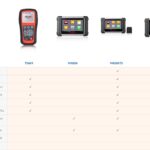Using outdated VCDS software can work on older vehicles, but it won’t support newer models (post-2018). While a legacy HEX+CAN interface might still function with older VCDS software versions, there are potential risks and limitations to consider. This article explores the safety and functionality of using outdated VCDS software.
Functionality of Outdated VCDS Software
Older VCDS software and HEX+CAN interfaces will likely continue to work on Volkswagen/Audi vehicles manufactured before 2019. The software and hardware were designed for those specific vehicle generations and their communication protocols. However, Volkswagen/Audi introduced significant changes in their diagnostic systems after 2018, requiring updated software and hardware for compatibility.
This means that using outdated software will limit your diagnostic capabilities for newer models. You won’t be able to access the latest features, perform certain procedures, or troubleshoot newer systems in these vehicles. For owners of older Volkswagen/Audi vehicles, outdated VCDS software can still be a valuable tool.
Risks of Using Outdated VCDS Software
While functionality on older cars is generally maintained, using outdated VCDS software carries some inherent risks:
-
Security Vulnerabilities: Outdated software might have known security vulnerabilities that could be exploited, potentially compromising your computer or the vehicle’s diagnostic system.
-
Lack of Support: Ross-Tech, the developer of VCDS, primarily supports the current version of their software. Using an outdated version means you won’t have access to technical support, bug fixes, or software updates.
-
Compatibility Issues: While unlikely, there’s a small chance that using outdated software could lead to compatibility issues with the vehicle’s systems, potentially causing errors or malfunctions.
-
Missed Features and Updates: Newer VCDS software versions often include improved functionality, bug fixes, expanded vehicle coverage, and access to the latest diagnostic procedures. Using an outdated version means missing out on these benefits.
Considerations for Using Legacy VCDS Hardware
Ross-Tech offers an upgrade path for legacy HEX+CAN interfaces, acknowledging that older hardware may not be supported indefinitely. This doesn’t necessarily mean the older hardware will cease to function, but it highlights the importance of considering long-term support and compatibility.
The manufacturer’s decision to focus on newer hardware reflects the evolving automotive landscape and the need to keep pace with technological advancements in vehicle diagnostics.
Conclusion
Ultimately, the decision of whether or not to use outdated VCDS software depends on your specific needs and the vehicles you intend to diagnose. For older Volkswagen/Audi models, it might still be a viable option. However, for newer vehicles and long-term usability, upgrading to the latest VCDS software and hardware is recommended to ensure full functionality, security, and support. This ensures you can diagnose and troubleshoot vehicles effectively and safely.

